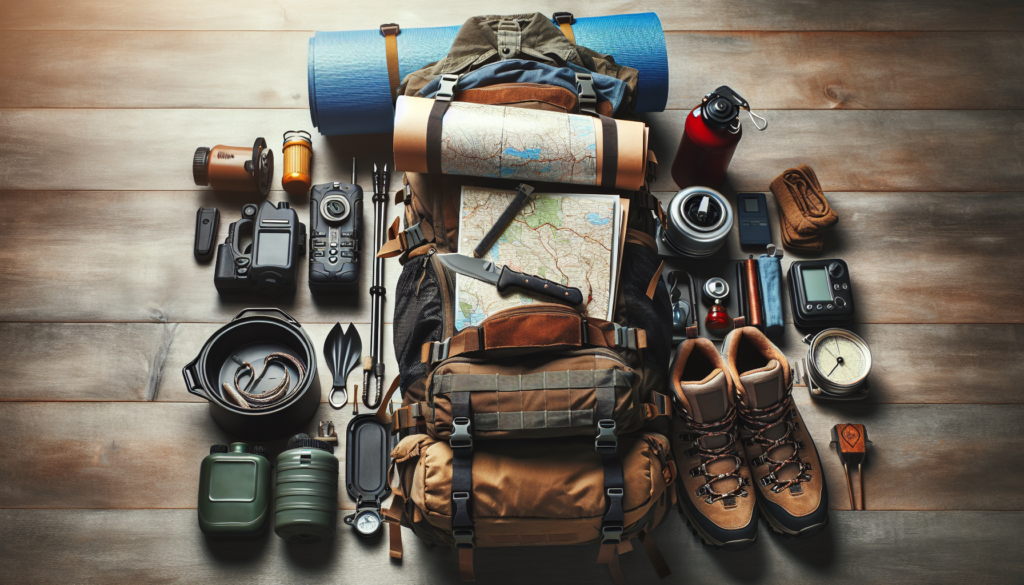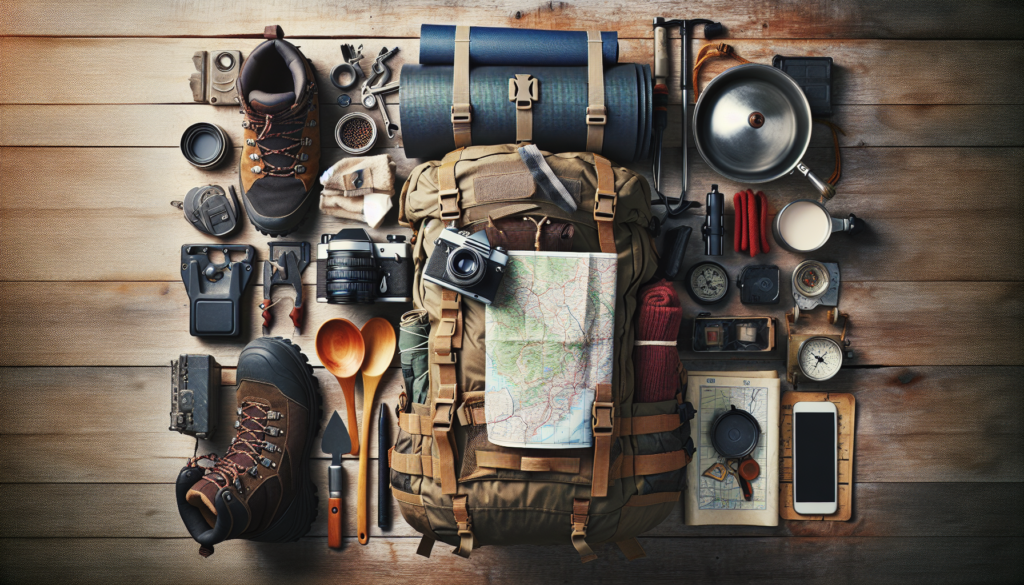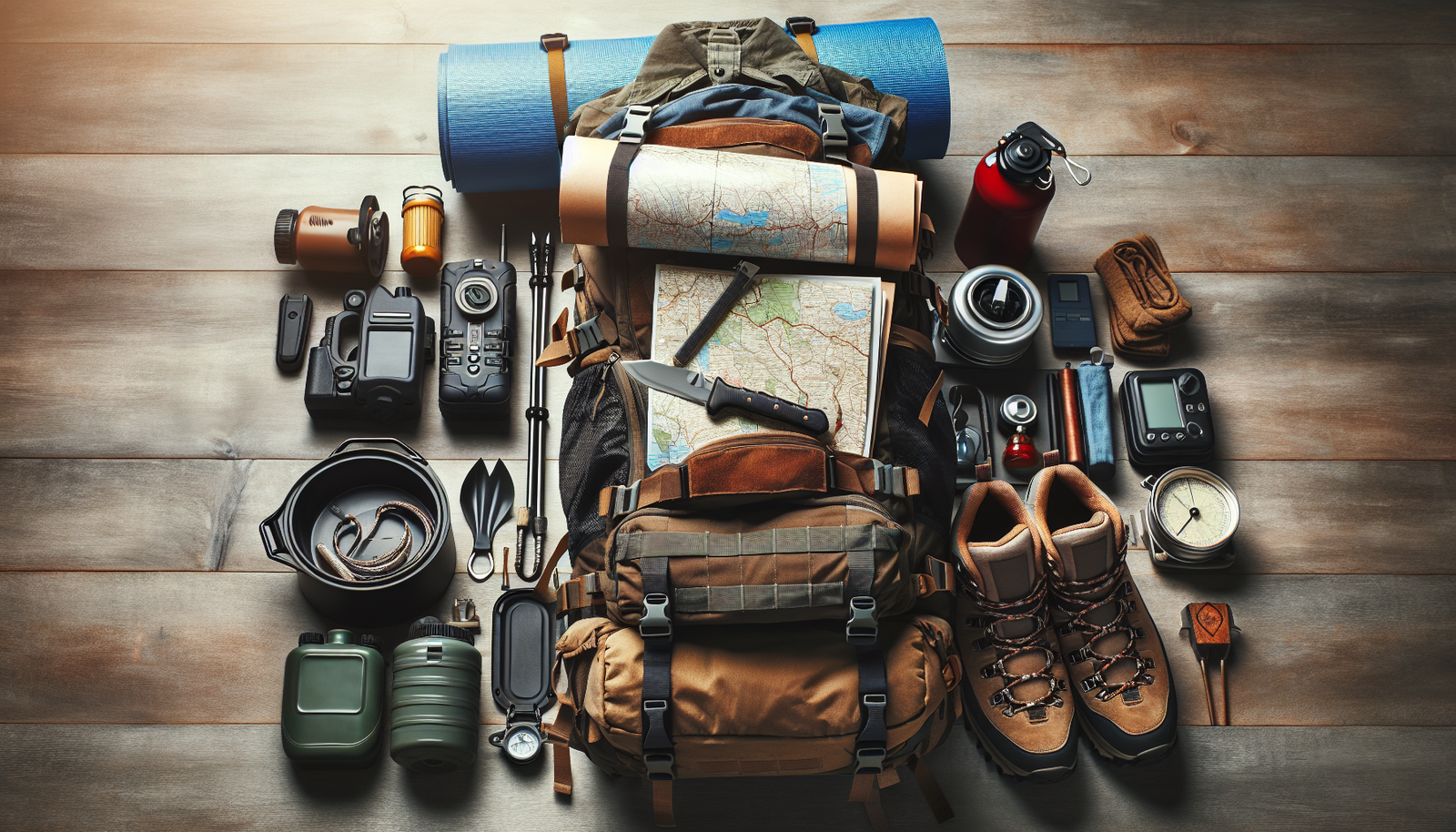Are you gearing up for an exciting overland adventure but feeling overwhelmed by the thought of packing efficiently? Look no further! In this article, we will share some valuable tips and tricks to help you pack like a pro for your upcoming journey. From choosing the right gear to maximizing space in your backpack, we’ve got you covered. So, get ready to embark on your overland trip with confidence, knowing that you have everything you need without the added stress of overpacking. Let’s dive in!

Creating a Packing List
When preparing for an overland trip, it is crucial to start by creating a packing list. This will help you stay organized and ensure you don’t forget any essential items. To begin, you should research your destination thoroughly. Consider the climate, local customs, and any specific gear requirements. This research will give you a good idea of what to expect and what items are necessary.
Next, think about the duration of your trip. Whether you’re going on a weekend getaway or a month-long adventure, the length of your journey will determine how much clothing, toiletries, and other personal items you need to pack. It’s important to strike a balance between packing enough and avoiding overpacking.
Once you have a good understanding of your destination and the length of your trip, it’s time to identify the essential items you need to bring. These items typically include clothing, toiletries, medication, electronics, and other personal necessities. It’s important to prioritize these items and ensure they make it onto your final packing list.
Choosing the Right Gear
Selecting the right gear is essential for a successful overland trip. One of the most important decisions you’ll make is choosing a suitable backpack. Look for one that is comfortable, durable, and has enough storage space for all your belongings. Consider the size of the backpack and whether it meets airline carry-on restrictions if you’ll be flying.
Another important factor to consider is the weight of your gear. Opt for lightweight and multifunctional items whenever possible. This will help reduce the strain on your back and make it easier to carry your backpack for longer periods. Look for gear that can serve multiple purposes, such as a lightweight jacket that can also be used as a raincoat.
When it comes to clothing, choose items that are appropriate for the climate and activities you’ll be participating in. It’s important to strike a balance between comfort and functionality. Moisture-wicking and quick-drying fabrics are ideal, as they will keep you comfortable in a variety of weather conditions.
Deciding on the right sleeping equipment is also crucial. Consider whether you’ll be camping or staying in accommodations along your journey. If camping, look for a compact and lightweight sleeping bag and a comfortable sleeping pad or mattress.
Lastly, always consider the weather conditions of your destination. Pack appropriate gear such as raincoats, umbrellas, or sun hats to protect yourself from the elements. Being prepared for various weather scenarios will ensure that you have a comfortable and enjoyable trip.
Organizing Your Belongings
Properly organizing your belongings is key to maximizing space and staying organized during your overland trip. Utilizing packing cubes or compression bags can help you stay organized by keeping similar items together and reducing the bulk of your clothing. These bags are especially useful for separating clean and dirty items.
The rolling clothes technique can also help save space and minimize wrinkles. Instead of folding your clothes, roll them tightly and pack them in your backpack. This technique also allows you to see all your clothes at once without having to dig through layers of folded items.
Utilize space-saving strategies to make the most of the available storage space in your backpack. For example, stuff socks or small items inside shoes or fill empty spaces with smaller items. Consider investing in travel-sized toiletries and condensing them into smaller containers to save space.
Separating clean and dirty items is crucial to maintaining cleanliness during your trip. Consider packing a separate laundry bag or using plastic bags to store dirty clothes until you have the opportunity to wash them. This will help keep your clean clothes fresh and minimize any unpleasant odors.
Lastly, maximize small storage spaces in your backpack. Use compartments or pockets to store frequently used items such as phones, wallets, or passports. This will make it easier to access these essential items without having to rummage through your entire backpack.
Prioritizing Useful and Versatile Items
When packing for an overland trip, it’s important to prioritize useful and versatile items. Choosing multipurpose items can help save space and reduce the number of items you need to pack. For example, a sarong can serve as a towel, beach cover-up, or even a blanket.
Creating a first aid kit is essential for any trip. Include basic medications, band-aids, antiseptic wipes, and any prescription medications you may need. It’s also a good idea to familiarize yourself with local medical facilities and emergency contact information.
Keeping hygiene essentials is crucial for maintaining your well-being during your trip. Pack travel-sized toiletries, such as toothpaste, shampoo, and soap. Consider bringing wet wipes for quick clean-ups and hand sanitizers for maintaining hygiene on-the-go.
Carrying a portable charger is essential for staying connected and ensuring your electronics stay powered. Look for a charger with multiple USB ports and sufficient battery capacity to keep your devices charged throughout your journey.
Bringing a multi-tool is always handy during an overland trip. This versatile tool can assist with various tasks such as opening bottles, fixing equipment, or even preparing food. Look for a compact and lightweight multi-tool that fits your needs.

Managing Documents and Money
Proper management of documents and money is crucial to a smooth and stress-free overland trip. Organize your travel documents, including passports, visas, and itineraries, in a secure and easily accessible manner. Consider using a document organizer or folder to keep everything in one place.
Having copies of important papers is essential for backup purposes. Make copies of your passport, travel insurance documents, and any other crucial papers. Store them separately from the originals, preferably in a secure location such as a hotel safe or a digital cloud storage.
Security of your money and valuables should be a top priority during your trip. Use a money belt or a hidden travel wallet to keep your cash and cards safe from pickpockets. Avoid keeping all your money in one place and distribute it among different pockets or secure locations.
Carrying emergency cash is always recommended. In case of any unforeseen circumstances, having a backup source of money can be a lifesaver. Store emergency cash separately from your daily spending and only use them in urgent situations.
Using a travel money belt is a practical way to keep your money and important documents safe. These belts can be worn discreetly under your clothing and provide an added layer of security.
Packing for Different Activities
Consider the specific activities you’ll be participating in during your overland trip. Whether it’s swimming, hiking, or exploring urban areas, packing accordingly can enhance your experiences.
For swimming activities, bring swimwear, towels, and any necessary beach gear. Don’t forget sunscreen, a hat, and sunglasses to protect yourself from the sun’s harmful rays. Consider packing a dry bag to keep your belongings dry while at the beach or near water.
If hiking or participating in outdoor activities, pack appropriate gear such as sturdy footwear, lightweight clothing, and a waterproof jacket. Don’t forget essential items like a hat, sunscreen, and insect repellent. Consider bringing a daypack for carrying water, snacks, and other necessities.
When packing for urban explorations, consider the local customs and dress codes. Research the cultural norms of your destination and pack clothing that is respectful and appropriate. Don’t forget comfortable walking shoes, a versatile jacket, and a small day bag for carrying essentials.
Preparing for Health and Safety
Your health and safety should be a top priority when preparing for an overland trip. Start by researching any required vaccinations or medications for your destination. Consult with a healthcare professional or visit a travel clinic to ensure you are up-to-date on any necessary immunizations.
Carrying a well-stocked first aid kit is essential for any travel adventure. Include items such as band-aids, antiseptic ointment, pain relievers, and any medications specific to your needs. It’s important to customize your first aid kit based on your health conditions and destination.
Ensuring adequate travel insurance is crucial for your peace of mind. Research and purchase a comprehensive travel insurance policy that covers medical emergencies, trip cancellations, and lost or stolen belongings. Familiarize yourself with the policy details and keep a copy of the insurance documents easily accessible.
Knowing emergency contact information is vital in case of any unforeseen circumstances. Save the contact information for local emergency services, your embassy or consulate, and any relevant helpline numbers. Store this information in your phone, write it down, and keep it easily accessible.
Being aware of safety precautions is important to ensure a safe and enjoyable trip. Research any travel advisories or safety concerns for your destination. Take note of common scams or risks and familiarize yourself with safety procedures in case of natural disasters or emergencies.
Packing Tips for Food and Water
When on an overland trip, it’s important to consider food and water packing tips. Bringing reusable water bottles is an eco-friendly way to stay hydrated throughout your journey. Look for bottles with built-in filters or bring water purification tablets to ensure safe drinking water.
Carrying portable water filters is another option for purifying water sources. These filters can remove harmful bacteria and parasites, allowing you to fill your reusable water bottles from natural sources such as rivers or streams. This can be especially useful for outdoor activities or remote areas.
Packing lightweight snacks is essential for maintaining energy levels during your trip. Choose snacks that are non-perishable and won’t easily get crushed or melted. Nuts, energy bars, and dried fruits are great options.
Consider the local cuisine of your destination and pack accordingly. If you have any food allergies or dietary restrictions, it’s important to plan ahead and bring suitable snacks or meal options. Researching local restaurants or grocery stores that cater to specific dietary needs can be helpful.
Knowing your food allergies and restrictions is crucial for your safety and well-being. Inform your travel companions, guides, or hosts about any specific dietary requirements you have. It’s also a good idea to carry allergy medication or food alternatives in case of accidental ingestion or exposure.
Considering Communication and Technology
Staying connected and navigating your way around your destination is essential during an overland trip. Finding the right travel SIM card can provide you with a cost-effective way to make calls, send messages, and use data. Research and purchase a SIM card that offers affordable roaming rates and coverage in your destination.
Downloading offline maps and guides can be a lifesaver, especially when you don’t have access to a stable internet connection. Many navigation apps and travel guides offer offline options that allow you to access maps, itineraries, and recommendations without using data or Wi-Fi.
Bringing a portable Wi-Fi hotspot can provide a reliable and secure internet connection throughout your journey. This can be especially useful if you require constant internet access for work, travel research, or staying connected with family and friends. Make sure to research providers and select a hotspot that offers coverage in your destination.
Protecting your electronics is crucial during an overland trip. Invest in sturdy cases or bags for your devices to prevent damage from rough handling or unforeseen accidents. Consider bringing waterproof or shockproof cases if you’ll be participating in outdoor activities or traveling to areas with unpredictable weather conditions.
Backing up important data is always recommended to avoid potential loss or damage to your files. Store important documents, photos, and other digital files in a cloud storage service or an external hard drive. This will provide peace of mind and ensure your important information is accessible even if your devices are lost or damaged.
Final Checks and Preparations
Before embarking on your overland trip, it’s important to go through a series of final checks and preparations. Start by checking baggage restrictions for your mode of transportation, whether it’s a flight, train, or bus. This will ensure that you comply with any size, weight, or prohibited item regulations.
Weighing your backpack before your trip is a good way to ensure you are not carrying an excessive load. It’s important to pack only what you need and avoid unnecessary weight. If your backpack exceeds weight limits, consider reevaluating your packing list and removing non-essential items.
Finalize your packing list by going through it one last time. Check off all the items you have packed and ensure everything is in order. This will give you peace of mind and help you avoid any last-minute panic or oversights.
Testing your gear, especially electronics, is essential before your trip. Ensure that your devices are charged, your power banks are functional, and any travel adapters or chargers are compatible. Test out your backpack to ensure it is comfortable and the weight is distributed evenly.
Knowing your itinerary is crucial for a smooth trip. Familiarize yourself with the timing, locations, and details of your planned activities. Make note of any reservations, transportation schedules, or important contact information. Having a clear understanding of your itinerary will help you navigate your trip efficiently.
In conclusion, efficiently packing for an overland trip requires thoughtful planning and consideration. By creating a comprehensive packing list, choosing the right gear, organizing your belongings, prioritizing versatile items, and taking necessary health and safety precautions, you can ensure a successful and enjoyable adventure. Remember to stay organized, prepare for various activities, pack suitable food and water items, consider communication needs, and thoroughly prepare for your trip before setting off on your overland journey.

